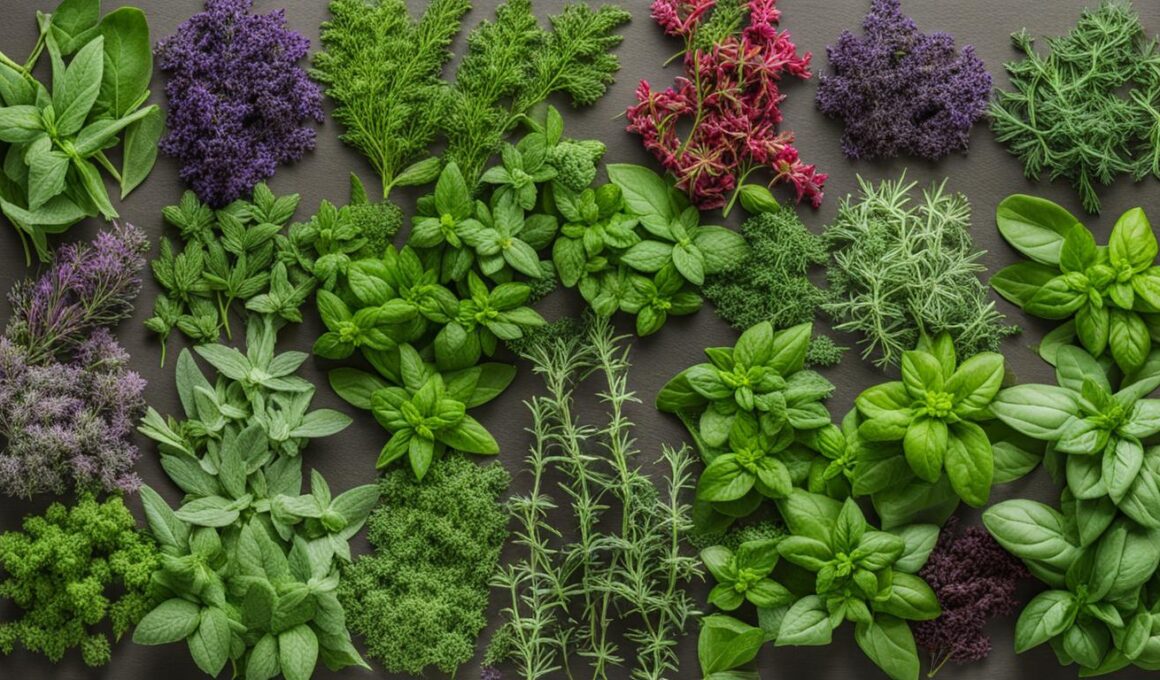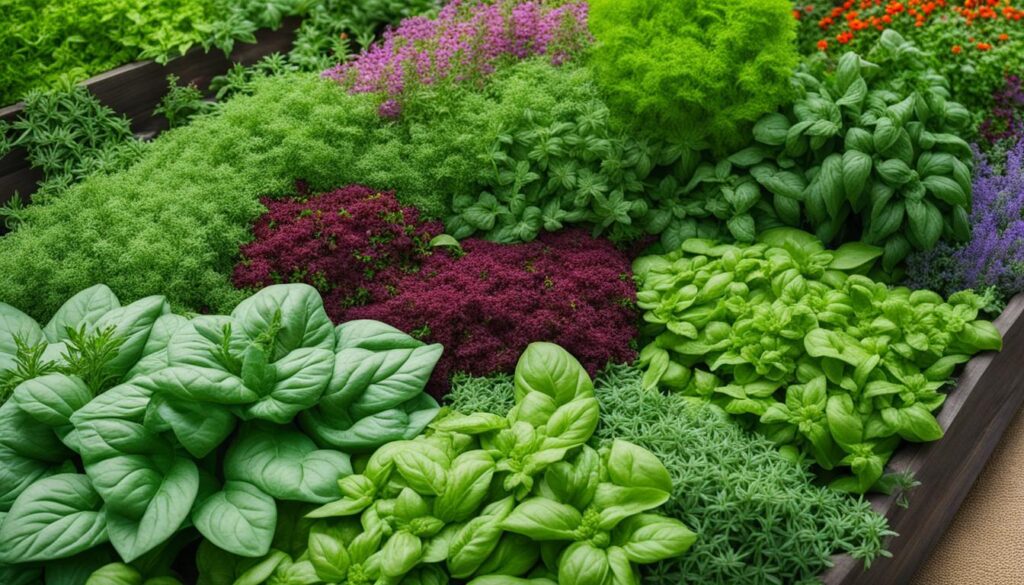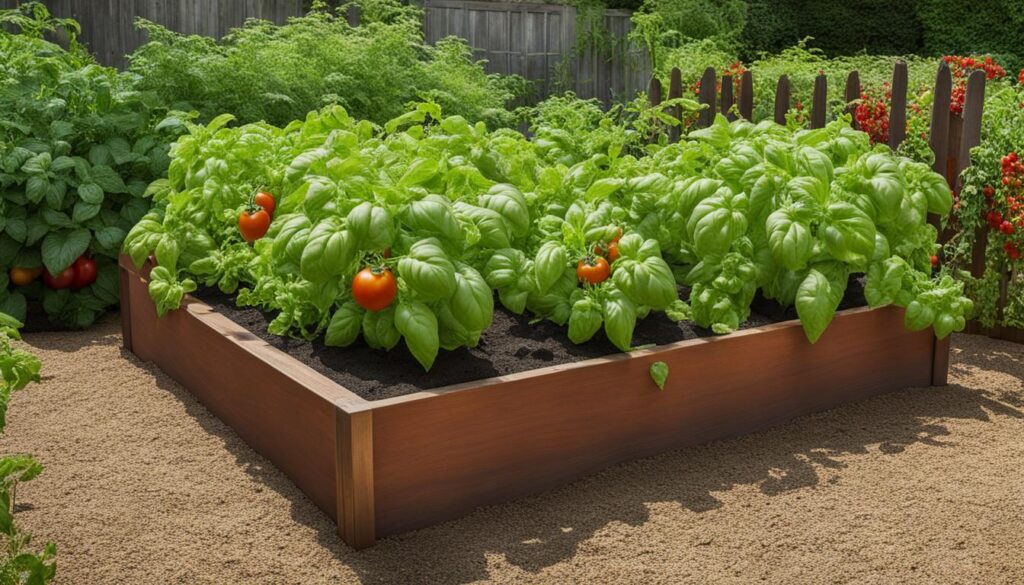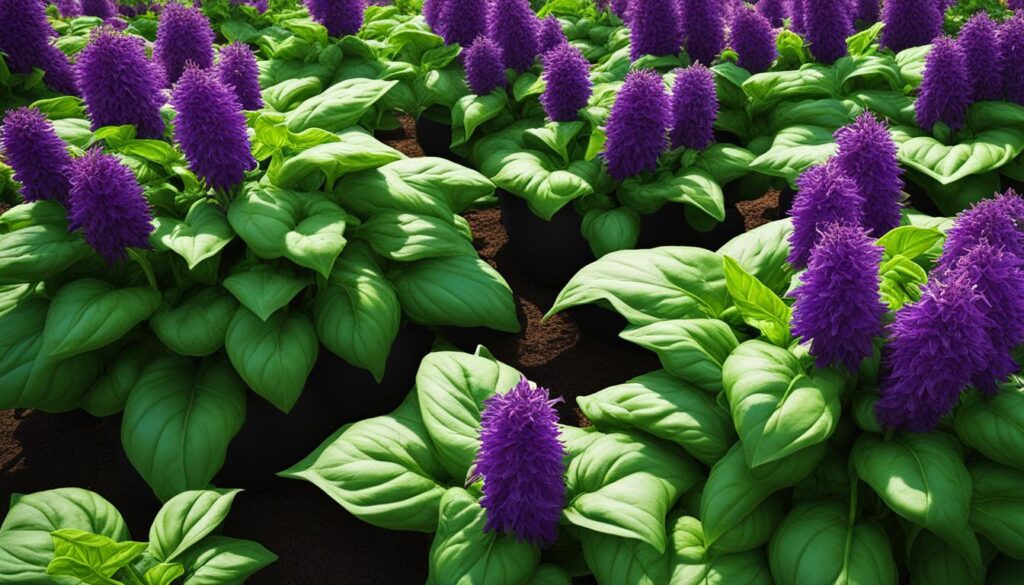Basil is not only a flavorful herb for cooking but also an excellent companion plant in your garden. Companion planting involves pairing two or more plants together to provide specific benefits for one or more of those plants. Basil has several advantages as a companion plant, including its ability to deter pests, attract beneficial insects, and improve pollination. In this article, we will explore the best herbs to plant with basil and how they can enhance your gardening experience.
Key Takeaways:
- Companion planting with basil offers numerous benefits for your garden.
- Basil acts as a natural deterrent for pests and attracts beneficial insects.
- Pairing basil with tomatoes, eggplants, cole crops, lettuce, and root crops can enhance their growth and flavor.
- Experiment with different herb combinations to find the best companions for basil in your garden.
- Companion planting promotes the health and productivity of your garden.
Why Basil is a Great Companion Plant
Basil offers numerous benefits as a companion plant. It acts as a deterrent for certain pests, attracts beneficial predatory insects, and serves as a pollinator magnet to improve pollination rates. Basil’s leaves contain many nutrients, and its culinary potential is well-known. When grown alongside other vegetables and herbs, basil enhances the health and productivity of these plants. It brings numerous benefits to the garden while requiring very little in return.
Benefits of Basil as a Companion Plant
One of the main advantages of planting basil alongside other crops is its ability to deter pests. The strong scent of basil repels insects like aphids, thrips, and hornworms, which are common garden pests that can cause damage to plants. By acting as a natural pest deterrent, basil helps protect the neighboring crops from infestation and reduces the need for chemical pesticides.
Furthermore, basil attracts beneficial predatory insects such as ladybugs, lacewings, and hoverflies. These insects prey on pests like aphids, mites, and caterpillars, providing natural pest control in the garden. By attracting these beneficial insects, basil creates a balanced ecosystem that helps keep pest populations in check.
In addition to pest control, basil also plays a significant role in improving pollination rates. The flowers of basil are highly attractive to bees and other pollinators. When bees visit basil flowers for nectar, they also transfer pollen from one plant to another, promoting cross-pollination and increasing fruit set in nearby crops. This enhanced pollination can lead to higher yields and better-quality produce.
The Benefits Extend Beyond the Garden
The benefits of planting basil as a companion plant extend beyond the garden. Basil’s aromatic leaves are highly valued in the culinary world, adding flavor and depth to a wide range of dishes. By growing basil alongside other crops, you not only enhance the health and productivity of your garden but also have a readily available supply of fresh basil for your culinary endeavors.
In conclusion, basil is a fantastic companion plant that offers multiple benefits for your garden. Its ability to repel pests, attract beneficial insects, and improve pollination rates makes it a valuable addition to any garden bed or container. Consider planting basil alongside vegetables like tomatoes, eggplants, cole crops, lettuce, and root crops to take advantage of its pest-deterring and pollinator-attracting properties. Incorporating basil into your garden not only enhances the overall health and productivity of your plants but also adds a flavorful touch to your culinary creations.
The Best Basil Companion Plants: Tomatoes
When it comes to companion planting, basil and tomatoes are a match made in gardening heaven. The combination of these two plants not only enhances flavors in the kitchen but also provides numerous benefits in the garden. Basil acts as a natural pest deterrent, protecting tomatoes from common pests that can cause damage to the plants.
The presence of basil near tomatoes can help repel thrips, yellow-striped armyworms, and tomato and tobacco hornworms, which are notorious for their destructive feeding habits. By interplanting basil between and around tomato plants, you create a barrier that these pests are less likely to cross, resulting in healthier tomato plants.
Furthermore, planting basil alongside tomatoes can also have a positive effect on the flavor of the tomatoes. Basil’s aromatic leaves emit a pleasant scent that can enhance the taste of the tomatoes, making them even more delicious when used in salads, sauces, or other culinary creations.
Companion planting basil with tomatoes not only provides pest control benefits but also enhances the flavors of both plants. The combination of these two garden favorites is a win-win situation that every gardener should consider.
To give you a better understanding of the benefits of basil and tomato companion planting, here’s a table summarizing the advantages and potential pests that basil can help deter in tomato plants:
| Pest | Benefit of Basil |
|---|---|
| Thrips | Basil acts as a deterrent for thrips, reducing damage to tomato plants. |
| Yellow-Striped Armyworms | Basil helps repel yellow-striped armyworms, protecting tomato plants from their destructive feeding habits. |
| Tomato and Tobacco Hornworms | Basil deters tomato and tobacco hornworms, reducing the risk of damage to tomato plants. |
By incorporating basil into your tomato garden, you not only promote a healthier and more productive environment but also elevate the flavors of your homegrown tomatoes. Consider planting basil alongside your tomatoes to experience the benefits firsthand.
The Best Basil Companion Plants: Eggplants
When it comes to companion planting, basil and eggplants make a winning combination. Not only do they complement each other in the kitchen, but they also work together in the garden to enhance each other’s growth and repel pests. Planting basil alongside eggplants can provide numerous benefits, including natural pest control and improved flavor.
Basil’s strong scent acts as a natural deterrent for pests that commonly attack eggplants, such as thrips and tomato and tobacco hornworms. By interplanting basil with eggplants, you create an environment that repels these pests, reducing the likelihood of damage to the plants. In addition, basil’s aroma can help mask the scent of the eggplants, making them less attractive to pests in the first place.
“The combination of basil and eggplants not only makes for a beautiful garden pairing but also offers practical benefits. The strong scent of basil acts as a natural pest repellent, protecting the delicate leaves of eggplants from infestations.”
Furthermore, the presence of basil can enhance the flavor of the eggplants. When grown together, the flavors of both plants complement each other, resulting in a more robust and delicious harvest. Whether you’re using them in a caponata, moussaka, or a simple pasta dish, the combination of basil and eggplants adds an irresistible depth of flavor.
| Basil Companion Plants | Pest Control Benefit | Flavor Enhancement |
|---|---|---|
| Eggplants | Basil deters pests like thrips and hornworms that can damage eggplants. | The combination of basil and eggplants results in enhanced flavors. |
Overall, planting basil alongside eggplants is a smart choice for any garden. With its natural pest-repellent properties and flavor-enhancing effects, basil can help ensure a successful and bountiful harvest of eggplants. So why not give this companion planting duo a try and reap the rewards in your own garden?
The Best Basil Companion Plants: Cole Crops
Cole crops, including kale, cabbage, broccoli, cauliflower, and collards, can benefit from planting basil as a companion. Basil serves as a trap crop for slugs and snails, diverting their attention away from the cole crops and protecting them from damage. The strong scent of basil also acts as a deterrent for pests like imported cabbageworms, reducing their population and minimizing damage to the cole crops. Additionally, basil’s flowers attract pollinators that are natural predators of cabbageworms, providing further pest control.
If you’re growing kale, cabbage, broccoli, cauliflower, or collards in your garden, consider interplanting them with basil. Not only will it help keep pests at bay, but it will also enhance the overall health and productivity of your cole crops. The combination of basil and cole crops creates a mutually beneficial environment that promotes thriving plants and bountiful harvests.
To visualize the benefits of basil companion planting with cole crops, refer to the table below:
| Cole Crop | Pest Control Benefits | Additional Benefits |
|---|---|---|
| Kale | Trap crop for slugs and snails Deters imported cabbageworms |
Attracts pollinators |
| Cabbage | Trap crop for slugs and snails Deters imported cabbageworms |
Attracts pollinators |
| Broccoli | Trap crop for slugs and snails Deters imported cabbageworms |
Attracts pollinators |
| Cauliflower | Trap crop for slugs and snails Deters imported cabbageworms |
Attracts pollinators |
| Collards | Trap crop for slugs and snails Deters imported cabbageworms |
Attracts pollinators |
The Best Basil Companion Plants: Lettuce
When it comes to companion planting, lettuce can greatly benefit from the presence of basil in your garden. Not only does basil enhance the flavors of both plants, but it also plays a crucial role in pest control for lettuce.
Lettuce often falls prey to aphids, which can damage the leaves and hinder its growth. However, by interplanting basil with lettuce, you can attract beneficial insects such as hoverflies and parasitic wasps. These natural predators feed on aphids, effectively reducing their population and keeping your lettuce plants healthy.
Furthermore, the flowers of basil provide nectar for these beneficial insects, creating a favorable environment that encourages their presence in your garden. By planting basil alongside lettuce, you can create a harmonious partnership that promotes biological control and improves the overall health of your lettuce crops.
In addition to basil, other herbs like oregano, fennel, and sage can also be planted alongside lettuce to attract similar beneficial insects. Consider incorporating these herbs into your garden to create a diverse and thriving ecosystem that supports the growth of your lettuce and provides natural pest control.
The Best Basil Companion Plants: Root Crops
When it comes to companion planting, basil proves to be a valuable ally for root crops such as beets, carrots, radishes, parsnips, onions, and garlic. By interplanting basil with these vegetables, you can benefit from its natural pest control properties and promote the healthy growth of your root crops.
Basil’s strong scent acts as a deterrent for pests like onion thrips, which can cause distorted leaf growth in onions and garlic. By planting basil alongside these root vegetables, you can help keep these pests at bay and ensure the optimal development of your crops.
In addition to pest control, basil can also help reduce damage caused by pests like carrot rust fly maggots and radish maggots. Its presence in the garden creates a less favorable environment for these pests, allowing your root crops to thrive.
Table: Basil Companion Plants for Root Crops
| Root Crop | Companion Plants |
|---|---|
| Beets | Basil, Swiss chard |
| Carrots | Basil, chives, rosemary |
| Radishes | Basil, lettuce, peas |
| Parsnips | Basil, onions, garlic |
| Onions | Basil, chamomile, dill |
| Garlic | Basil, chamomile, dill |
“Interplanting basil with root crops can help reduce damage from pests and promote healthy growth.”
Experiment with different combinations of basil and root crops to find the most effective companion planting arrangement for your garden. By harnessing basil’s pest control abilities, you can create a thriving ecosystem that benefits both your root crops and the overall health of your garden.
What Are the Benefits of Companion Planting Basil with Other Herbs in My Garden?
Basil is one of the best herbs for basil companion planting in your garden. When planted with other herbs like parsley, thyme, and oregano, it can help repel pests and attract beneficial insects. This method also improves soil health and overall plant growth, resulting in a successful and diverse garden.
Conclusion
Companion planting basil with other herbs and vegetables in your garden can provide a range of benefits. By choosing the right companion plants, you can create a symbiotic relationship that promotes the health and productivity of your garden. Basil acts as a natural pest deterrent, attracting beneficial insects and improving pollination rates.
When planted alongside tomatoes, basil helps deter pests like thrips and hornworms, while enhancing the flavor of the tomatoes. Interplanting basil with eggplants not only repels pests but also enhances the flavors of both plants. Basil acts as a trap crop for slugs and snails when planted with cole crops, protecting them from damage. Additionally, basil attracts hoverflies and parasitic wasps, which prey on aphids that can harm lettuce.
Basil also benefits root crops by deterring pests like onion thrips and carrot rust fly maggots. Planting basil with root vegetables helps keep these pests at bay, promoting healthy growth. Experiment with different combinations of herbs and vegetables to find the best companion plants for your basil.
By incorporating companion planting techniques and choosing the right herbs to plant with basil, you can enjoy the benefits of improved pest control, enhanced flavors, and increased pollination rates in your garden. Happy gardening!
FAQ
What is companion planting?
Companion planting involves pairing two or more plants together to provide specific benefits for one or more of those plants.
What are the benefits of planting basil with other herbs and vegetables?
Companion planting basil with other herbs and vegetables can improve pest control, enhance flavors, and increase pollination rates.
Which plants can basil deter pests from?
Basil can deter pests from tomatoes, eggplants, cole crops, lettuce, and root crops.
How does basil deter pests?
Basil’s strong scent repels pests, protecting plants from damage and promoting healthy growth.
Which plants can basil attract beneficial insects to?
Basil can attract beneficial insects to tomatoes, eggplants, cole crops, lettuce, and root crops.
How does basil improve pollination?
The flowers of basil attract pollinators, which can improve pollination rates in the garden.
How can basil enhance the flavors of other plants?
Basil’s presence can improve the flavor of tomatoes, eggplants, cole crops, lettuce, and root crops.












